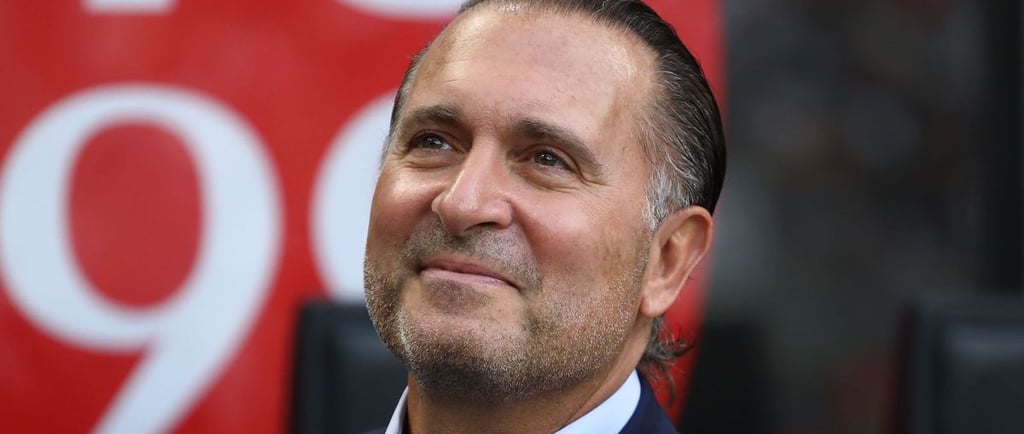CARDINALE: "NON VOGLIO AMERICANIZZARE IL MILAN"
NEWS


22 dicembre 2024
L'Harvard Business School ha pubblicato un documento di 24 pagine in cui analizza il caso AC Milan, di cui Giorgio Furlani, ex alunno dello stesso ateneo, è attualmente l'amministratore delegato.
Un testo in cui si analizza il progetto del club dall'arrivo di Gerry Cardinale e in cui diversi protagonisti di proprietà e società hanno preso la parola per esprimere il proprio punto di vista.
Di seguito le dichiarazioni piu interessanti del proprietario rossonero Gerry Cardinale:
Sull'acquisto del Milan: "Quando abbiamo acquistato il Milan molti proprietari di squadre sportive americane mi hanno chiamato per dirmi: 'Sei pazzo'. Mi hanno detto che 'Non puoi fare affari in Italia' e 'È impossibile fare soldi nel calcio europeo'. La maggior parte di coloro che investono in società sportive lo fanno perché sono coinvolti emotivamente. Mettono la vittoria dei campionati al di sopra di tutto il resto e questo spesso li porta a commettere l'errore di pensare che spendere troppo per schierare una squadra di stelle sia linearmente correlato alla vittoria. Ma questa è la cosa peggiore che puoi fare come investitore".
Sulla vittoria dello scudetto nel 2022: "La passione dei tifosi è stata incredibile. Non avevo mai visto niente del genere. Ho inviato le foto alla mia squadra a New York e ho detto loro: 'È meglio che vi prepariate'".
Ancora sull'acquisto del Milan: "L'abbiamo acquistato per una cifra che corrispondeva a 3,6 volte i ricavi del club; i nuovi proprietari del Chelsea FC l'hanno acquistato per un multiplo di sette volte i ricavi se si considera l'earn out. Ho portato con me i New York Yankees per una piccola quota di minoranza, data la nostra partnership di lunga data con loro e il nostro desiderio di portare le migliori pratiche degli sport statunitensi in Italia. Penso che il Milan abbia il potenziale per diventare un'azienda da 5 miliardi di euro".
Sulla scelta di Furlani come Amministratore Delegato: "Avrei potuto assumere qualcuno con un casting nel calcio europeo. Ma Giorgio pensa come pensiamo noi in RedBird. Lui, come Stefano Cocirio, è un po' un unicum per il calcio europeo: giovane, libero dal fare le cose perché 'è così che si sono sempre fatte', ha una formazione da investitore, italiano ma istruito e formato negli Stati Uniti e nel Regno Unito. Ho capito che l'elemento più importante del ruolo di CEO nel calcio europeo è la responsabilità finanziaria e la capacità di integrare le prestazioni in campo e fuori dal campo."
Su Ibra: "La maggior parte delle persone considererebbe la sua nomina come una 'vetrina' o penserebbe a me come a un proprietario innamorato delle celebrità. È l'esatto contrario: sto cercando persone di livello mondiale che possano renderci migliori. Con Zlatan volevo affermare che faremo le cose in modo diverso perché c'è una legittima necessità di innovazione nel gestire meglio queste risorse. Quindi l'ho assunto per RedBird come operating partner e come senior advisor per la proprietà presso il Milan".
Sullo stadio: “Potremmo ristrutturare significativamente il nostro stadio esistente o costruirne uno nuovo che rifletta lo status attuale di questi club come società di intrattenimento per eventi dal vivo. Per ciò che costerebbe la ristrutturazione, potremmo probabilmente costruire uno stadio completamente nuovo. Ma costruire stadi in Italia è una sfida - l’ultimo stadio costruito in Italia è del 2011 e aveva 40.000 posti. Mi piacerebbe vedere la costruzione di uno stadio moderno con 70.000 posti, ma non stiamo ricevendo molto aiuto dal Comune per ottenere le approvazioni urbanistiche nella nostra posizione preferita. E sto ancora cercando di affrontare il disallineamento tra la costruzione di uno stadio in stile americano, che probabilmente costerà oltre 1 miliardo di euro, e l’impossibilità di applicare prezzi in stile americano. È una vera sfida”.
Sul suo progetto: “Non sto cercando di americanizzare l’AC Milan. Sto cercando di introdurre alcuni elementi americani che possano portare il Milan al livello successivo in modo costruttivo. Sto anche concentrando più attenzione sulla Serie A. Sono curioso di vedere come possiamo aiutarli a negoziare accordi sui media internazionali."
Obiettivi sul breve e lungo termine: “Vincere campionati è ovviamente un obiettivo importante. Ma bisogna bilanciare questo con il ‘vincere con intelligenza.’ L’Inter ha vinto lo scudetto l’anno scorso e poi è andata in bancarotta (il riferimento è all’ex proprietario insolvente, non al club in sé, ndr) - è questo davvero quello che vogliamo? Per i tifosi, il mio lavoro è vincere il campionato italiano ogni anno- lo capisco. Per i miei investitori che si concentrano sull’apprezzamento del valore finale, il mio lavoro è posizionare l’AC Milan per lottare per lo scudetto ogni anno, qualificarsi per la Champions League ogni anno, e andare il più lontano possibile nella Champions League ogni anno - questo è ciò che massimizza il flusso di cassa e il valore del marchio. È la coerenza e la minore ampiezza nella volatilità delle performance che massimizza il valore e, in ultima analisi, la longevità”.
EN VERSION
Harvard Business School has released a 24-page report examining the AC Milan case. The club's CEO, Giorgio Furlani, a former alumnus of the prestigious institution, plays a central role in the analysis. The document explores the club’s development since the arrival of Gerry Cardinale and features insights from various key figures in the ownership and management structure, who shared their perspectives.
Below are some of the most notable statements from AC Milan owner, Gerry Cardinale:
On the purchase of AC Milan:
"When we bought AC Milan, many American sports team owners called me and said: 'You’re crazy.' They told me, 'You can’t do business in Italy,' and 'It’s impossible to make money in European football.' Most people who invest in sports teams do so because they’re emotionally involved. They prioritize winning championships above everything else, and that often leads them to make the mistake of thinking that overspending on assembling a team of stars is directly correlated with winning. But that’s the worst thing you can do as an investor."
On winning the 2022 Serie A title:
"The passion of the fans was incredible. I’d never seen anything like it. I sent photos to my team in New York and told them: 'You better get ready for this.'”
On buying the club:
"We acquired it for a value equivalent to 3.6 times the club’s revenues. By comparison, the new Chelsea FC owners purchased it for a multiple of seven times revenue if you include the earn-out. I brought the New York Yankees in for a small minority stake due to our long-standing partnership with them and our desire to bring best practices from U.S. sports to Italy. I believe AC Milan has the potential to become a €5 billion company."
On appointing Giorgio Furlani as CEO:
"I could have hired someone with a European football background. But Giorgio thinks the way we do at RedBird. Like Stefano Cocirio, he’s a bit of a rarity in European football: young, unbound by doing things the way they’ve always been done, trained as an investor, Italian but educated and shaped in the U.S. and the U.K. I’ve realized that the most important aspect of the CEO role in European football is financial accountability and the ability to integrate on-field and off-field performance."
On Ibrahimović’s role:
"Most people would see his appointment as a publicity stunt or think of me as an owner enamored with celebrity. It’s the exact opposite: I’m looking for world-class individuals who can make us better. With Zlatan, I wanted to demonstrate that we’ll do things differently because there’s a legitimate need for innovation in managing these assets better. So, I brought him to RedBird as an operating partner and a senior advisor to the ownership group at AC Milan."
On the stadium:
"We could significantly renovate our existing stadium or build a new one that reflects the current status of these clubs as live entertainment companies. For the cost of a renovation, we could likely build an entirely new stadium. However, building stadiums in Italy is a challenge—the last stadium built in Italy was in 2011, with a capacity of 40,000 seats. I’d like to see a modern 70,000-seat stadium, but we’re not getting much support from the local government in securing urban planning approvals for our preferred location. I’m also still grappling with the mismatch between building an American-style stadium, which would likely cost over €1 billion, and the inability to apply American-style pricing. It’s a real challenge."
On his vision for AC Milan:
"I’m not trying to Americanize AC Milan. I’m trying to introduce some American elements that can take Milan to the next level in a constructive way. I’m also focusing more attention on Serie A. I’m curious to see how we can help them negotiate international media deals."
Short- and Long-Term Goals:
"Winning championships is, of course, an important goal. But it must be balanced with ‘winning smart.’ Inter won the Scudetto last year and then went bankrupt (referring to the previous insolvent owner, not the club itself). Is that really what we want? For the fans, my job is to win the Italian championship every year—I understand that. For my investors, who focus on the long-term appreciation of value, my job is to position AC Milan to contend for the Scudetto every year, qualify for the Champions League every year, and go as far as possible in the Champions League every year—that’s what maximizes cash flow and brand value. It’s consistency and reduced volatility in performance that maximize value and, ultimately, longevity."
